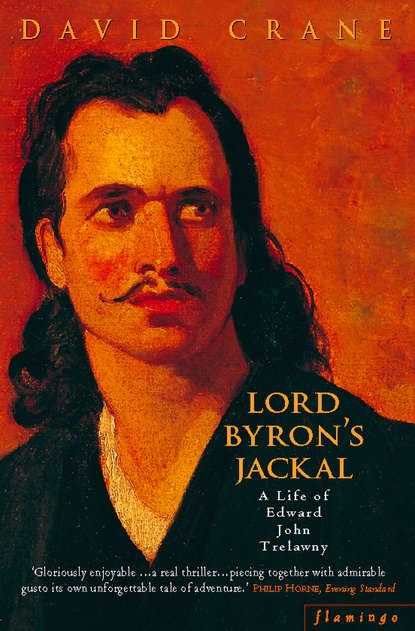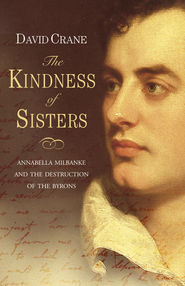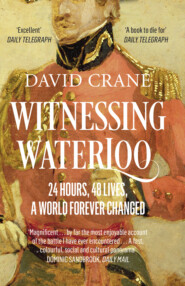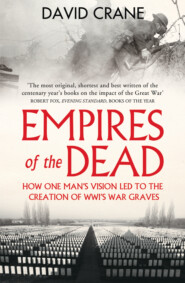По всем вопросам обращайтесь на: info@litportal.ru
(©) 2003-2024.
✖
Lord Byron’s Jackal: A Life of Trelawny
Настройки чтения
Размер шрифта
Высота строк
Поля
as her, Mrs Trelawny’s life depended on it: She also promised most fervently, never to be guilty of such a Crime again, and begged that the Deponent would herself make the Excuse to Mr Trelawny for wishing him to quit his lodgings.
(#litres_trial_promo)
The excuse Mrs Prout came up with was that she needed to paint their rooms, and sometime towards the end of July or the beginning of August the couple moved to new lodgings near Bath owned by a Captain White. Within a short time an unrepentant Caroline was recruiting different members of the White family to collect mail addressed to her under fictitious names at addresses in the town, but if the trial evidence is to be believed, no hint of this seems to have reached Trelawny, who alone among his landladies, servants and his mother-in-law was unaware of his wife’s liaison.
Even if Trelawny was ignorant of what was going on, however, relations between him and Caroline had deteriorated beyond repair, and after the birth of their second daughter at Vue Cottage communications between them were bizarrely limited to written requests for interviews. Unable to tolerate this atmosphere any longer, Mrs White finally asked them to leave, fixing 31 December for their departure. ‘About four o’Clock in the Afternoon however of that day,’ Mrs White testified to the Consistory Court,
Mrs Trelawny being wanted in the Drawing Room, the Deponent and others of her family went to seek her all over the House but she was not to be found: Captain White and Mr Trelawny then left the House to go different ways in search of her, and the Deponent was afterwards informed by her said husband that he had met with Mrs Trelawny who had acknowledged to him that she had eloped with the Intention of proceeding to Captain Coleman at Southampton, and pressed him (Captain White) not to prevent her, but that he had conducted her to her Mother in Bath, and left her under her said Mother’s protection, without apprizing Mr Trelawny therof.
(#litres_trial_promo)
Trelawny’s humiliation was complete, the injury to his pride as the case dragged through the courts public and prolonged. For over two years after her elopement he was forced to live with the sordid details of her betrayal, with the bleak evidence that crumpled sheets and billets doux, towels drying at parlour windows and provincial intimacies made up the sad reality of his waking hours.
The one consolation to emerge from this crisis was the friendship of the White family with whom he and Caroline had boarded, and in particular with the young daughter Augusta. In the wider picture of his life this relationship is of only marginal importance but, in the way their kindness brought out all those feelings that had been stifled in childhood and the navy, it foreshadows the most important ties of his life. From the start the Whites had taken his side against Caroline and when, in the February after her elopement, Captain White, dragged down by debts and depression, killed himself, their friendship was sealed. ‘After so dreadful a catastrophe most of your friends would write lamentations at your Father’s rash fate,’ he wrote to Augusta,
but as I differ and am not swayed by opinions of other men – I shall commence with rejoicing that your unfortunate Father has at last ended his miseries … tell your mother to command me in every way … If I can be of the most trivial service command me and I will fly down to my loved Sisters … Your mother shall find in me a Son, you a Brother, and your Brothers a Father.
(#litres_trial_promo)
That last note, so revealing of the emotional vacuum marriage had done nothing to fill, is repeated in another letter to Augusta, written from his family house in Soho Square on 1 October 1817. ‘With my trunks,’ he wrote,
arrived your affectionate letters My Dear Kind Sister, they infused new life, into my drooping soul, – ought not such a friend to counterbalance, all the ills I have endured, – Your love, and sympathy, soothed my signed soul – and bid me hope … O my dearest Sister could you but see my heart, you would wonder it should be inclosed, in so rough a form; – my study through life, has been, to hide under the mask of affected roughness, the tenderest, warmest, and most affectionate sencibility.
(#litres_trial_promo)
Only a handful of Trelawny’s letters survive from this period, and yet colourful as they are, they need to be treated warily as evidence of his feelings. The temptations of so sympathetic a correspondent for a humiliated cuckold are too obvious to need spelling out, but what is more interesting is the impression his letters give that he had neither the education nor the vocabulary at this period to express or even understand the more complex aspects of his personality.
Trelawny was a late and slow developer, and nowhere is this plainer than in his correspondence. With the mature Trelawny it is a safe bet that when he writes something he says precisely what he means to say, but in his early years there is an invariable sense of a man struggling for a voice and character, of a writer fumbling towards an identity that he has not yet made his own.
In their very turbulence, however, their romantic theatricality, their heavy posturing, these letters remain the clearest sign of the inward transformation that Trelawny underwent during the unhappy years of navy and married life. There is no doubt that in the best traditions of romantic alienation he went out of his way to exaggerate his loneliness to any woman prepared to listen, but as in childhood the misery was real enough and the overriding consequence of his marriage was to drive Trelawny into an internalized world of the imagination in which he could take refuge from the disappointments of life.
Collaborating in this retreat, shaping and colouring this inner world, were the books on which Trelawny glutted himself during these wilderness years in Bristol and London. If his grammar and spelling are anything to go by, he had left the navy as ignorant and illiterate as the day he entered, but in the first years of peace he set out on a bizarre but heroic course of reading and self-improvement that was to alter his life, immersing himself in the tragedies of Shakespeare and the romances of Scott, in the defiance of Milton’s Satan and the violence of Jacobean revenge, in Hope’s Anastasius and Peacock’s Nightmare Abbey, in the poetry of Rogers, Cowper, Young, Falconer and Moore, but above all – ten of the fifty odd volumes in his library in 1820 – in the exotic, profligate and dazzling world of Byron’s poetry and tales.
The influence of Byron on Trelawny’s development is a classic example of the sad paradox that while great art seldom made anyone a better person bad art can be profoundly dangerous. There were certainly aspects of Byron’s wonderful mature genius from which Trelawny might well have learned but it was the self-indulgent Byron of Childe Harold that lodged in his soul, the gloomily antisocial heroes of the Eastern Tales like Lara or Conrad, mysterious, violent and aristocratic outcasts from a petty world, in whom he found the model, mirror and philosophical justification for his own troubled personality.
It seems almost too pat that also among his books at this time was Volney’s Ruins of Empire, the work from which Frankenstein’s monster, listening at the cottage window, learned all he knew of human society, but it is too potent a symbol of Trelawny’s plight to let pass. In old age Trelawny was to become an extraordinarily open-minded and intelligent judge of books, but the failed midshipman who fed off Byron in this way was above all an outcast, an intellectual and emotional outsider incapable of measuring a world of which he was largely ignorant, desperate only to find in his reading some echo or corroboration of his own feelings.
There is nothing rare in men or women shaping their lives by some ideal but as one looks at the influence of Byronic Romanticism on Trelawny during these years it seems doubtful that anyone ever chose so spurious a model. He seems to have been able to read and re-read the great tragedies of Shakespeare, and learn nothing but quotations. Dryden has left no mark. Jane Austen appears never to have been read. Byron, however, filled his imagination, shaped his aspirations and confirmed him in his worst excesses, determined the way he talked and wrote, the way he dressed and behaved, until within a decade it was impossible for contemporaries to know whether he had spawned the Corsair or the Corsair him.
It was under this influence, in the boarding houses of Bristol, Bath and London, that Trelawny now committed himself to that major deception which was ultimately to transform his existence. It is hard to imagine that the idea of actual imposture can have seized hold of him all at once, and yet as the failures became starker his youthful daydreams must have taken on a more urgent and adult significance, edging the innocent escapism of his naval days ever closer to a wholesale denial of a life which had let him down.
It would be another dozen years before the fantasies of these years took on their definitive shape in Adventures, but it is still in its pages that we can best trace the genesis of a story that for the next century and more would enjoy the status of history. According to the version of his ‘autobiography’, Trelawny’s ship was in harbour in Bombay when he and a friend called Walter decided to desert, and formed a friendship with a man calling himself De Witt, but whose name turns out to be the equally fictional De Ruyter.
Trelawny’s devotion to him was immediate and complete. There was nothing De Ruyter could not do, nothing he did not know, no way either physically or mentally that he was not Trelawny’s superior. He was approaching his thirtieth year, could speak most European languages faultlessly, and all the native dialects from ‘the guttural, brute-like grunting of the Malay, the more humanized Hindostanee’ to the ‘softer and harmonious Persian’ with equal ease.
(#litres_trial_promo) In stature he was majestic, ‘the slim form of the date-tree’ disguising ‘the solid strength of the oak’.
(#litres_trial_promo) His forehead was smooth as sculptured marble, his hair dark and abundant, his features well defined, his eyes – the windows to his restless and brilliant soul – as various as a chameleon in their colour.
Shortly after coming under De Ruyter’s spell, the incident occurred in this imaginary version of events that ended Trelawny’s naval servitude. The two men were playing billiards, when a Scotch lieutenant who had tormented his and Walter’s lives entered. He demanded to know when Trelawny was rejoining his ship, which was sailing the next day. At this Trelawny’s blood seemed to ignite with fire, and then congeal to ice. He dashed his hat in the man’s face, tore off the last insignia of bondage from his own dress, and drew his sword. The lieutenant broke into abject disclaimers of friendship, and begged his pardon. In his rage Trelawny struck him to the ground, kicking and trampling and spitting on him as the creature begged for mercy. ‘His screams and protestations,’ Trelawny wrote,
while they increased my contempt, added fuel to my anger, for I was furious that such a pitiful wretch should have lorded it over me so long. I roared out, ‘For the wrongs you have done me, I am satisfied. Yet nothing but your currish blood can atone for your atrocities to Walter!’
Having broken my own sword at the onset, I drew his from beneath his prostrate carcass, and should inevitably have despatched him on the spot, had not a stronger hand gripped hold of my arm. It was De Ruyter’s; and he said, in a low, quiet voice, ‘Come, no killing. Here!’ (giving me a broken billiard cue) ‘a stick is a fitter weapon to chastise a coward with. Don’t rust good steel.’
It was useless to gainsay him, for he had taken the sword out of my hand. I therefor belaboured the rascal: his yells were dreadful; he was wild with terror, and looked like a maniac. I never ceased till I had broken the butt-end of the cue over him, and till he was motionless.
(#litres_trial_promo)
The young rebel who had suffered under his father’s brutality, under the cruelty of the Reverend Seyer, and in the navy, was at last free. The mysterious De Ruyter who had passed himself off in Bombay as a merchant, now revealed himself as a privateer operating under a French flag, an enemy to all tyranny and corruption, and in the seventeen-year-old midshipman recognized his spiritual heir and child.
It was the beginning of a new life, and under the leadership of this man, Trelawny embarked on the imaginary career of adventure, excitement, bloodshed, romance and crime which forms the great bulk of his ‘autobiography’. There is no summary of Adventures that can possibly do justice to the colour and imaginative profligacy of his fantasies, nothing that can capture either the compelling immediacy of Trelawny’s fictional world or the visions of violence and domination with which he took his revenge on Caroline and a world that stolidly refused to come up to expectations. As a lonely and unhappy young midshipman, he had daydreamed with his friend Walter of a life without parents, patrimonies or ties ‘amidst the children of nature,’
(#litres_trial_promo) but the dreams now were more sinister. Crazed stallions, Malay peasants, naval officers, ugly old women are all brutally mastered, bullied, beaten, burned, killed or crushed like toads beneath his feet. The vegetation and landscape of the east which so prosaically reminded Lord Minto of a Chinese wallpaper, takes on a vivid almost surrealistic life. Wild animals fill his vision with the same haunting, threatening force that they have in Othello. It is wish fulfilment on the grand scale. In De Ruyter the emotional orphan has found a father; in the lovely Zela, shy and beautiful as a faun, devoted to Trelawny until she expires in his arms after a shark attack, the cuckold at last finds the bride he deserves; and in the excitement, colour and violence of his adventures, the unemployed midshipman wins the recognition the Royal Navy had denied him.
After the public humiliations of the King’s Bench and Consistory Courts, Trelawny was ready to face the world, a Byronic hero with a history and personality to match. In the depths of his imagination he had forged an identity which seemed more vividly true to his sense of self than the reality he had left behind, and if the same might be said of every creative liar, what distinguishes him from a Savage or Baron Corvo is that for the next five years life was to give him what he wanted with an almost Faustian prodigality – years in which invention became a self-fulfilling ordinance, and events danced to the tune of the imagination until fantasy and life pursued each other in an unbreakable circle.
If psychologically he was prepared for a new life, financially, too, he was at last able to expand his horizons. Through all the rows with his father he had continued to draw an allowance of three hundred pounds a year, and while that was scarcely enough to support a family in comfort, for a single man ready to live abroad it opened up possibilities of leisured and gentlemanly self-indulgence. On 19 May 1819, the Royal Assent to his divorce was given, freeing him of those domestic ties which had shackled his turbulent spirit. The seven lean years were over. Caroline, at last, was out of his life, taking their younger daughter, Eliza, with her. The elder child, Julia, had been farmed out to friends of the Whites. He seems to have backtracked too from the brief intensity of his friendship with Augusta, allowing it to mellow into a mutual warmth which lasted throughout their lives.
The disappointment and failures of the navy and marriage, the first-floor parlours and bedrooms, were not just forgotten but buried. Mentally he had toughened and changed, developing out of all recognition from the dull lout his uncle had found him ten years earlier. At the age of twenty-eight he had also physically grown into the role he had created for himself, tall, dark, athletic, immensely strong and handsome. All he needed now was a stage on which to play out his new part. His father had offered to buy him a commission in the army, but for a follower of De Ruyter that was hardly an option. He had talked vaguely for a time of South America as well, of joining either General Wilson or a commune. In the end, however, he settled for the Continent. One of his last addresses in England before leaving was 7 Orange St, the site now of the archives of the National Portrait Gallery. It was a prescient choice of address for a man about to launch himself into the forefront of the nation’s consciousness.
2 THE SUN AND THE GLOW-WORM (#ulink_629081b8-3cf9-53b3-9119-6fec8e4dfd31)
‘You won’t like him.’
Byron to Teresa Guiccioli
(#litres_trial_promo)
IT MUST HAVE BEEN sometime in the autumn of 1819 or the beginning of 1820 that Trelawny finally left England for the Continent, travelling first to Paris where his mother was chaperoning his sisters on a predatory hunt for husbands, and from there to Geneva.
With the poverty of letters from this time it is impossible to be dogmatic about Trelawny’s motives but there would have been compelling reasons other than disappointment and money for his decision to live abroad. There appears to have been nothing particular in his choice of Switzerland, but for a man of his burgeoning radicalism the England of Castlereagh and the Peterloo Massacre can have seemed no place to be, a country frozen in the mini ice-age of reaction which gripped post-Napoleonic Europe, a land, in Shelley’s savage assault, of,
An old, mad, blind, despised, and dying king, –
Princes, the dregs of their dull race, who flow
Through public scorn, – mud from a muddy spring, –
Rulers who neither see, nor feel, nor know,
But leech-like to their feinting country cling,
Till they drop, blind in blood, without a blow, –
(#litres_trial_promo)
At a time when so many European liberals were seeking refuge in England, there seems something stubbornly wrongheaded in the reverse process, but for Trelawny at least the freedom the Continent offered had more to do with the texture of life than any considered set of principles. Like so many men of his nation and class nineteenth-century Europe represented above all else a continuation of the eighteenth century ‘by other means’, an opportunity – heterosexual, homosexual, financial, social or whatever – to pursue a style of life which inflation and the looming threat of ‘Victorian’ morality was endangering at home.











